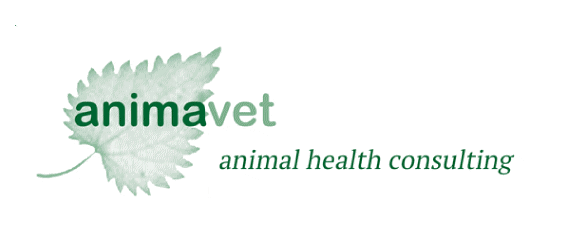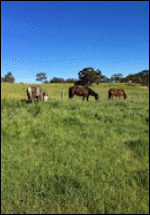
Christine King BVSc, MANZCVS (equine), MVetClinStud
Organic Trace Minerals
 I am currently using the Zinpro Availa- line of trace mineral supplements. These products combine single minerals with one or more amino acids (e.g., copper-lysine) to create a highly bioavailable source of trace minerals for livestock such as horses.
I am currently using the Zinpro Availa- line of trace mineral supplements. These products combine single minerals with one or more amino acids (e.g., copper-lysine) to create a highly bioavailable source of trace minerals for livestock such as horses.
- About this photo: I took this photo in central Victoria in late spring. Analysis of this 'improved' pasture showed it to be adequate in most minerals except for copper, zinc, and manganese. It was marginally deficient in zinc and manganese, and grossly deficient in copper, in relation to the needs of horses.
- It is not possible to know the mineral content of pastures or hays without forage analysis. It is therefore not possible to know what, if anything, is needed in the way of mineral supplementation. In the absence of forage analysis, offering the single minerals free-choice may be the best bet to avoid deficiencies — and to avoid excessive supplementation, which is a waste of money and can interfere with the absorption of other minerals.
Although a variety of amino acids may be used to complex with these minerals, Zinpro uses essential amino acids — those that cannot be produced by the animal and thus are essential in the diet. These supplements therefore have the additional benefit of supplying small amounts of essential amino acids.
- These trace mineral supplements are organic in that the mineral is complexed with a carbon-containing molecule, in this instance an essential amino acid. (As carbon is a component of all known living things, carbon-containing compounds form the basis of organic chemistry.) These supplements are man-made, but they're the closest I've found to pure minerals in the molecular forms naturally found in plants and animals. With these supplements, the mineral content can be precisely and consistently known, whereas the mineral content of plant material can vary widely, as my pasture example demonstrates.
- The one exception with these products is cobalt, which is complexed with glucoheptonate, an alpha-hydroxy acid. The reason for this difference is because the cobalt is only indirectly supplementing the animal — by supplementing its gut microbes. When well supplied with cobalt, the gut microbes produce vitamin B12 (cobalamine or cobalamin) which is then absorbed by the animal and put to use. From a microbial perspective, complexing the cobalt with an alpha-hydroxy acid such as glucoheptonate is the more bioavailable form. This particular trace mineral provides a fascinating glimpse into the importance of our gut microbes in our overall health and well-being.
These mineral-amino acid complexes are highly bioavailable because they are water-soluble. The complexes readily dissociate (separate) in the digestive tract so the minerals are available for absorption, rather than passing through the gut unchanged and unused.
Also important is that these mineral supplements contain a very simple carrier (calcium carbonate and ground corncobs) that is added merely to aid commercial production and consistency. These mineral supplements contain no tasty fillers or flavour enhancers, so the animal is not tempted to overeat them.
- They also contain no salt. Salt is best provided separately as plain white salt, Celtic sea salt, or one of the mineral salts such as Redmond salt or Himalayan pink salt.
Lastly, these mineral supplements have a stable shelf-life when kept in a sealed container, away from direct light and heat, such as in a resealable bag in a cupboard or feed locker.
Below are specific instructions for feeding the individual trace mineral supplements I currently stock.
Copper
An organic source of copper, for use as a dietary supplement in horses.
Contains copper (108 mg/g) as a copper-lysine complex.
Also contains calcium carbonate and ground corncobs.
Available in the following packages (approximate supply for the average-size horse):
75 grams (60-days supply)
125 grams (3-months supply)
250 grams (> 6-months supply)
500 grams (> 1-year supply)
1 kg (bulk supply for multiple horses)
Suggested use for the average-size horse:
1. Offer free-choice in a separate tub. To avoid excessive intake, put out a maximum of 2 level teaspoons (10 grams, ~ 1 week’s worth) at a time. Refill the tub at the same rate (up to 2 tsp/week).
OR
2. Feed one-quarter (1/4th) of a teaspoon (1.25 grams) per day.
***
May also be fed to cattle, at the same rate as for horses, or 100 grams per 80 head per day.
DO NOT FEED TO SHEEP
Store in an airtight container, away from direct light and heat.
FOR ANIMAL USE ONLY. Keep out of reach of children.
Sheep are very sensitive to dietary copper and may develop potentially fatal copper toxicity when fed a mineral supplement formulated for horses, cattle, or goats. If you have sheep, please ensure that they do not have access to this supplement.
Zinc
An organic source of zinc, for use as a dietary supplement in horses.
Contains zinc (120 mg/g) as a zinc-methionine complex.
Also contains calcium carbonate and ground corncobs.
Available in the following packages (approximate supply for the average-size horse):
180 grams (60-days supply)
300 grams (3-months supply)
600 grams (> 6-months supply)
1.1 kg (> 1-year supply)
2 kg (bulk supply for multiple horses)
Suggested use for the average-size horse:
1. Offer free-choice in a separate tub. To avoid excessive intake, put out a maximum of 1 level tablespoon (20 grams, ~ 1 week’s worth) at a time. Refill the tub at the same rate (up to 1 tbsp/week).
OR
2. Feed one-half (1/2) of a teaspoon (3 grams) per day.
***
May also be fed to cattle, sheep, and goats at the following rates:
Cattle — same as for horses.
Sheep — 1/2 teaspoon (3 grams) free choice every 10 days.
Double this rate (i.e., either 1 tsp every 10 days or 1/2 tsp every 5 days) during periods of decreased food intake or high production stress.
Goats — 1/2 teaspoon (3 grams) free choice every 7 days.
Double this rate (i.e., either 1 tsp every 7 days or 1/2 tsp every 3 or 4 days) during periods of decreased food intake or high production stress.
Store in an airtight container, away from direct light and heat.
FOR ANIMAL USE ONLY. Keep out of reach of children.
Trace 5
An organic source of copper, zinc, manganese, cobalt, and chromium, for use as a dietary supplement in horses.
Contains the following trace minerals:
copper (15.6 mg/g) as a Cu-lysine complex
zinc (45 mg/g) as a Zn-methionine complex
manganese (25 mg/g) as a Mn-methionine complex
cobalt (1.5 mg/g) as Co-glucoheptonate
chromium (875 mcg/g) as a Cr(III)-methionine complex
Also contains calcium carbonate and ground corncobs.
Available in the following packages (approximate supply for the average-size horse):
480 grams (60-days supply)
800 grams (3-months supply)
1.6 kg (> 6-months supply)
3 kg (> 1-year supply)
(Email to enquire about bulk supply for multiple horses)
Suggested use for the average-size horse:
1. Offer free-choice in a separate tub. To avoid excessive intake, put out a maximum of 3 level tablespoons (60 grams, ~ 1 week’s worth) at a time. Refill the tub at the same rate (up to 3 tbsp/week).
OR
2. Feed one-and-a-half (1.5) teaspoons (8 grams) per day.
***
May also be fed to cattle, at the same rate as for horses.
DO NOT FEED TO SHEEP
Store in an airtight container, away from direct light and heat.
FOR ANIMAL USE ONLY. Keep out of reach of children.
Sheep are very sensitive to dietary copper and may develop potentially fatal copper toxicity when fed a mineral supplement formulated for horses, cattle, or goats. If you have sheep, please ensure that they do not have access to this supplement.
Selenium-E
An organic source of selenium and natural vitamin E, for use as a dietary supplement in horses.
Each teaspoon (5 grams) contains:
selenium (2 mg) as selenium yeast; at least 70% as selenium-methionine complex
This product is Selemax, made by the Brazilian company Biorigin. I'm told that Zinpro Availa-Se is not available in Australia (how ironic), so I had to find a good substitute. This product contains no carrier.
vitamin E (2,000 IU equivalent), derived from vegetable oil; 100% RRR-alpha-tocopherol acetate.
This product is Natural Source Vitamin E250 by ADM Animal Nutrition in the US. It contains 250 mg/g natural vitamin E, with a bioequivalence of 500 IU/g synthetic vitamin E. Silicon dioxide is used as a carrier to aid commercial production and consistency.
Available in the following packages (approximate supply for the average-size horse):
150 grams (60-days supply)
225 grams (3-months supply)
450 grams (6-months supply)
900 grams (1-year supply)
2 kg (bulk supply for multiple horses)
Suggested use:
ADULT HORSES
Average size (400–500 kg): 1/2 level teaspoon per day, or 3.5 level teaspoons per week free-choice.
Ponies (~ 200 kg): 1/4 level teaspoon per day, or 1.5 level teaspoons per week free-choice.
Draft breeds (~ 900 kg): 1 level teaspoon per day, or 2 level tablespoons per week free-choice.
These rates also apply to horses in light to moderate work and pregnant mares. Increase by 25% for horses in heavy work and lactating mares.
FOALS
Nursing (4–6 months): 1/2 adult rate
Weanling (6–12 months): 3/4 adult rate
Yearling and above: adult rate
***
For use when no other source of selenium is being fed.
AVOID OVERDOSING by using kitchen measuring spoons and being precise (level spoonful, not rounded or heaped).
Store in an airtight container, away from direct light and heat.
FOR ANIMAL USE ONLY. Keep out of reach of children.
***
Selenium and natural vitamin E are also available separately. Please contact me for details.